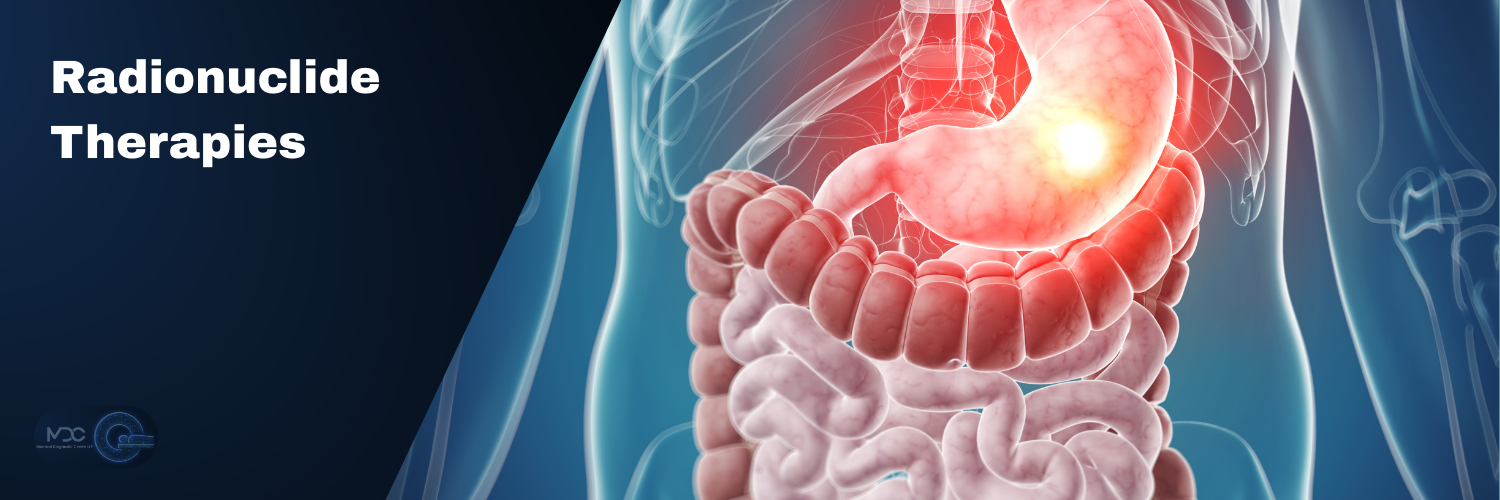What is Radionuclide Therapy?
Radionuclide Therapy is an advanced targeted cancer treatment that uses radioactive substances to precisely target and destroy cancer cells while minimizing damage to surrounding healthy tissues. It combines diagnostic imaging with effective therapy, providing a comprehensive approach to cancer care.
Why Should You Consider Radionuclide Therapy?
Radionuclide therapy is effective for treating:
- Prostate cancer (Lutetium-177 PSMA therapy)
- Thyroid cancer (Radioiodine I-131)
- Neuroendocrine tumors (PRRT therapy)
- Bone pain relief from metastases (Radium-223)
- Lymphoma treatment (Yttrium-90 or Iodine-131)
Common Types of Radionuclide Therapies
Lutetium-177 PSMA Therapy
- Targets prostate cancer cells with high precision.
- Shrinks tumors and slows the progression of the disease.
Radioiodine Therapy (I-131)
- Commonly used for thyroid cancer and hyperthyroidism.
- Destroys abnormal thyroid cells effectively.
PRRT (Peptide Receptor Radionuclide Therapy)
- Primarily used for neuroendocrine tumors (NETs).
- Targets cancer cells by binding to specific receptors, delivering radiation directly.
Radium-223 (Xofigo®)
- Used for bone metastases, especially in prostate cancer.
- Provides pain relief and improves survival rates.
How Does Radionuclide Therapy Work?
- Initial Scan: Diagnostic imaging (like PET/CT or SPECT) is used to identify the tumor targets.
- Customized Dose: A specific dose of radioactive material is injected or infused into the body.
- Targeted Radiation: The radiation selectively destroys cancer cells, with minimal impact on healthy tissues.
- Follow-Up Imaging: Post-treatment scans are used to check the effectiveness of the therapy.
Preparation for Radionuclide Therapy
- Fasting: Some therapies require fasting (depends on the type).
- Medications: Certain medications (like thyroid hormones for I-131) may need to be stopped.
- Hydration: Drink plenty of water before and after the procedure.
- Safety Measures: You may need to follow isolation precautions to protect others from radiation exposure.
Procedure and Recovery
- Treatment Time: Ranges from 30 minutes to 2 hours (depending on the therapy).
- Hospital Stay: Most treatments are outpatient, but some may require a short stay.
- Side Effects: Mild fatigue or nausea (usually temporary).
- Follow-Up Care: Additional scans and tests to monitor treatment response.
Why Choose Radionuclide Therapy?
- Targeted Treatment: Spares healthy cells and focuses on cancerous tissue.
- Non-Surgical: No need for invasive surgery.
- Theranostic Approach: Combines both diagnosis and treatment in one.
- Effective for Advanced Cancers: Enhances quality of life by managing advanced-stage cancers.
Consult with our Nuclear Medicine Specialist to see if you are a candidate for this cutting-edge treatment.
Book a Consultation now!
Complete Care: From imaging to personalized therapy.
Note: Treatment suitability depends on the type and stage of cancer, as well as the patient’s overall health. Safety protocols ensure minimal radiation exposure to both patients and caregivers.
